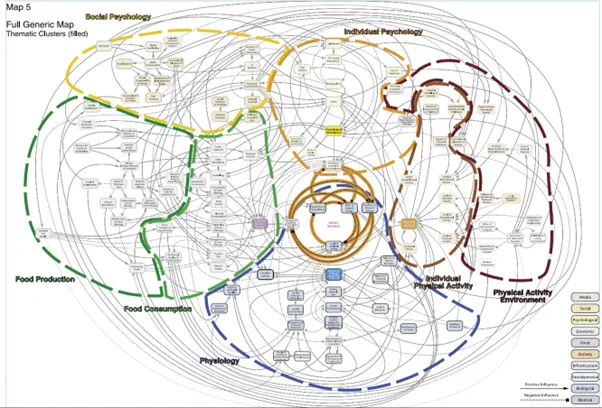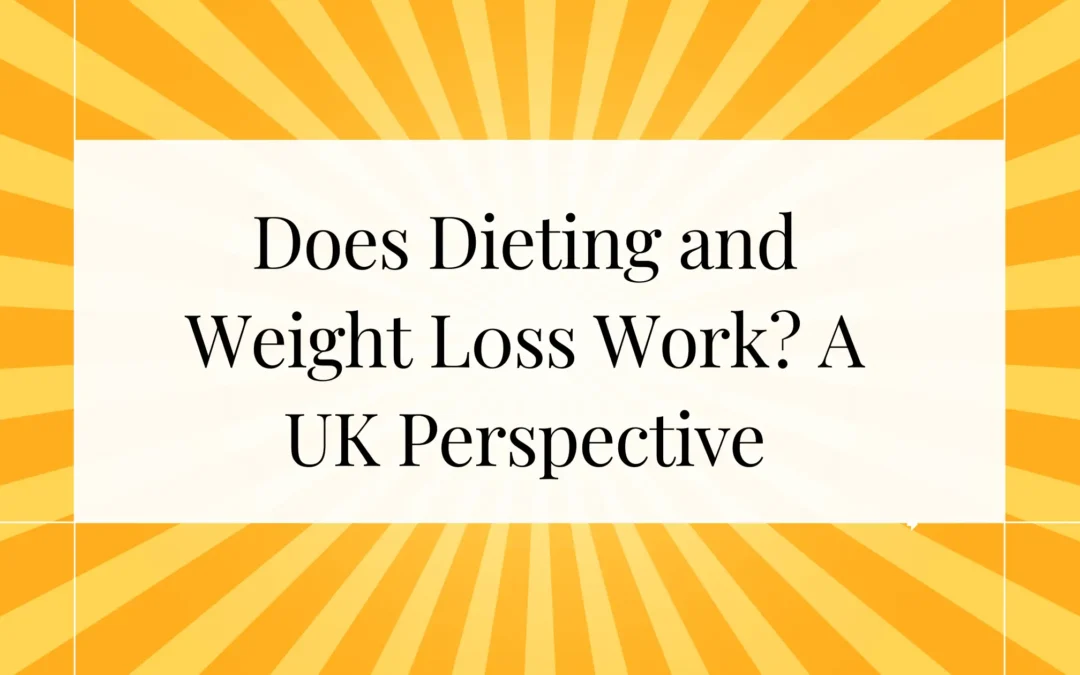“One day, it will click in place and losing weight will be just so easy for you. You just have to be in the right mindset” I remember a fellow nutrition student telling me when I voiced my desperation to lose weight. 46% of the UK left the same way as I did on that day back in 2007 and pursued intentional weight loss. How have we faired in recent history with the focus on weight in the UK? What impact has this recent history had on us? Does dieting and weight loss work in the UK? What conclusions can we draw?
We’ve had the breakdowns from the other side of the pond (aka America) and now it’s time to see how the UK (mainly England) fits into this.
Weight loss, Dieting and UK government policy
Being a student Nutritionist at that time meant watching the government at the time release research on fatness through a major independent report called the Foresight Report in 2007. It was the latest biggest push to discover more about fatness, why there are fat people and how we can decrease people’s fatness. This report was one of the first of it’s kind in England with tall hopes of reducing having a big impact on fatness in the UK. I used this report in my dissertation about children’s school meals. Weight talk was everywhere and seen as a big problem.
The Foresight report did nod to the complexities around weight and how much our weight is actually predisposed (eg by our DNA) and how many things actually impact our weight. The image below is taken directly from the report and shows how intensely complicated it is.

Althought this photo is a fantastic visual to see how intensely complicated we are, unfortunately at the same time, it states that fatness is an individual’s responsibility.
Encouraging the UK to Eat Less and Move More
From the Foresight report in 2007, initiatives were created in 2008 called Healthy Weight Healthy Lives from which Change4Life also came. Their goals to reduce all fatness but mainly children. This focused on diet and exercise, aka eat less and move more.
More recent pushes for weight loss in the UK has come during the Covid pandemic with £100 million being invested in reducing fatness in one year through NHS weight management programmes between 2021-2022.
That is a lot of time, money and resources being spent on reducing overall fatness. Over the years, this focus has been on dieting. Eating less and moving more has been the main advise that has of course varied in it’s delivery. Low fat, low carb, high fibre, eat “clean”, do not eat “junk” food, track your calories/syns/points, be more “mindful”, fast, eat more protein, drink more water. Have these interventions over the years made an impact weight loss and dieting in the UK?

I mapped this from the Healthy Survey data available on the government’s website. What I find so interesting is that, despite there being such a big investment on reducing overall fatness over the last 18 years; fatness has not been reduced. You would have thought that this massive investment would have produced some kind of result. I could argue that the marginal increase in fatness could be due to the weight increase that comes from yo yo dieting, which is a well documented impact of yo yo dieting. The weight increase could also be due to the increase in stigmatisation and discrimination which has also been shown to impact weight (Latner et al, 2003). Unfortunately due to the medicalisation of fatness, these have not been explored nearly enough.
Prevalance of Dieting in the UK
I can almost hear the critique that maybe people are not trying hard enough to lose weight. It is well documented that weight loss attempt prevalence is actually high with 43% of people in England trying to lose weight in 2021 (IPSOS, 2021) yet even with this high prevalence, weight overall is not going down. I think that is enough people to show the people are trying hard to lose weight but, in reality, they end up back at square one.
Diet Culture and Wellness Culture
In the 00s to now, wellness culture and diet culture has been booming. Money being spent on diets and intentional weight loss is at an all time high and continues to grow year on year. Yet we have a marginal uptick in fatness. Certainly not the “epidemic” have been told about.
History of BMI in the UK
Historically, fatness was only ever beauty standards and thinness standards which has comes directly from racism. “Fearing the Black Body” by Sabrina Strings or this podcast gives you a far better explanation than I ever could as a white woman. Please do read up on that. But when we look at the history of healthism linked with anti fatness aka being fat = unhealthy, this didn’t actually begin happening until fairly recent history.
BMI and Nuance
Up until the mid 1990s, BMI had been something that had been discussed and researched since the 1960s. Even when the World Health Organisation (WHO) cemented the BMI classifications as we know it today in the UK, there were still arguments going on about research showing that separate charts for males and females should exist as well as a consideration to having different charts of adults in different stages in their lives to take account of normal weight gain throughout life and research to show that fatness as we age may be protective. It had also been discussed about smoking and having a separate chart for smokers and non-smokers (Fletcher, 2013). But the WHO decided that a more simplistic way to measure fatness is something that the world needed so they ignored the nuance of weight.
I think its important to note how nuanced the conversation were around weight before the BMI was in place. Conversations around the difference in “health” and the challenged around weight science were common place without arguments over “health burdens”.
Funnily enough, at the same time the WHO defined BMI, there was the brand new International Ob*sity Task Force headed up by a British researcher who was reported saying that it was funded by the pharmaceutical industry. This task force quite literally forced the WHO to have a consultation about fatness when it hadn’t actually even planned to. Interestingly, this process started when the Fen-Phen (a weight loss drug) was taking off. This consultation was accepted by the WHO without any changes and the BMI classifications changed over night meaning people who were considered originally “ov*rweight” were then considered as “ob*se”. By the end of 1997, Fen-Phen had been banned from used because they discovered that 1/3 people were dying from using it.
This is considered a really important moment in history fatness and healthy wise. The medicalisation and healthism of fatness had started. The nuance of weight science started to become unacceptable and it was widely spoken about internationally that fatness is caused by eating too much and not moving enough.
The Start of UK Anti Fat Policies
By the end of the 1990’s, BMI had been fully established and in the UK we had our first mentioning of ob*sity in “Saving Lives: Our Healthier Nation” 1999 talking about preventing early deaths but does not have any targets or strategies in reducing fatness. “NHS Plan: A Plan For Investment. A Plan for Reform” in 2000 gives a target to have local action to “tackle ob*sity and physical inactivity” by 2004.
I do think it is interesting that at the start of the 1990s, the reported percentage of people classed as “ob*se” started at 13% and had a fairly dramatic increase. Was it the food and “laziness”? Was it a change in socio economics? Was it due to increase in weight discrimination and stigmatisation during that time (Puhl et al, 2012)? We do not actually know.
What we do know is that between the 1990 and the early 2000s, there was an increase in fatness but between the 2000s and now, a marginal increase has happened. And in that time the “treatment” has largely remained the same.
The Cost of Anti Fat Policies
You remember that £100 million that the government in the UK invested in NHS weight loss management? Well that money was spent on 16% of people who were referred and participated in the weight management programme to lose 5lb each with no data at 6 months. Which means that the NHS spent £8167.26 per person who lost 5 lb. This money was not invested again the following years.
If diet and exercise was going to work to reduce our weight, it would have done by now. We would have population that is maintaining a low level of fatness or at least have a downwards trend of fatness. When I have people challenging me about how “easy” it is to lose weight, or how weight loss is just about “calories in vs calories out” or not believing that for most people, diets do not work, I remind myself of this history. We have over 2 decades of trying to actively get people to lose weight because of “health” and we still have fat people. It is almost as if weight isn’t as simple as we have been led to believe and weight loss and dieting doesn’t work.
Diets Don’t Work; HAES and Weigh Inclusive Approaches?
If dieting and weight loss is not working, what do we do? We are being told to lose weight for our health but the evidence I have just taken you through shows how impossible it is! At a society level, we need to be taking a difference approach that de-centers weight. A focus on weight is not a focus on health.
This kind of approach is called a weight inclusive approach but also professionally wise can be Health at Every Size. Health at every size doesn’t mean that anyone can be healthy at every size but that anyone should have access to healthcare regardless of their size. Tearing down and challenging societies assumptions made on a large group of people is important. This would reduce the impact of weight stigma, oppression and marginalisation a fat person experiences.
Individually, having access to have weight inclusive healthcare and treatment would mean that you receive healthcare regardless of your weight and without weight loss being prescribed, allowing you to experience good quality healthcare with less barriers. It means you can learn and have healthy behaviours that do not include weight loss. We know that weight loss doesn’t work and could makes things worse which means that weight loss isn’t the answer.
17 years on from being a student Nutritionist, it never “clicked” to lose weight and keep it off. Of course, I dieted plenty of times. I am a now UK size 24 and will never intentionally lose weight again. But now I know that I can healthy behaviours regardless of my weight AND that me not being able to keep the weight off is not my fault and common for the majority of people, I feel the best I ever have about myself and my nutrition.
Want to know more? I have more blogs!
The Dangers of Dieting : An Evidence-Based Examination
What is Intuitive Eating UK?
How do you start Intuitive Eating?
Free Ebook – From Food Overwhelm to Food Freedom
Feeling overwhelmed by food and food choices? I know the feeling. This free e book helps you understand your food overwhelm, discovering why you may be overwhelmed, and helps you find out about food freedom and how to find it!

